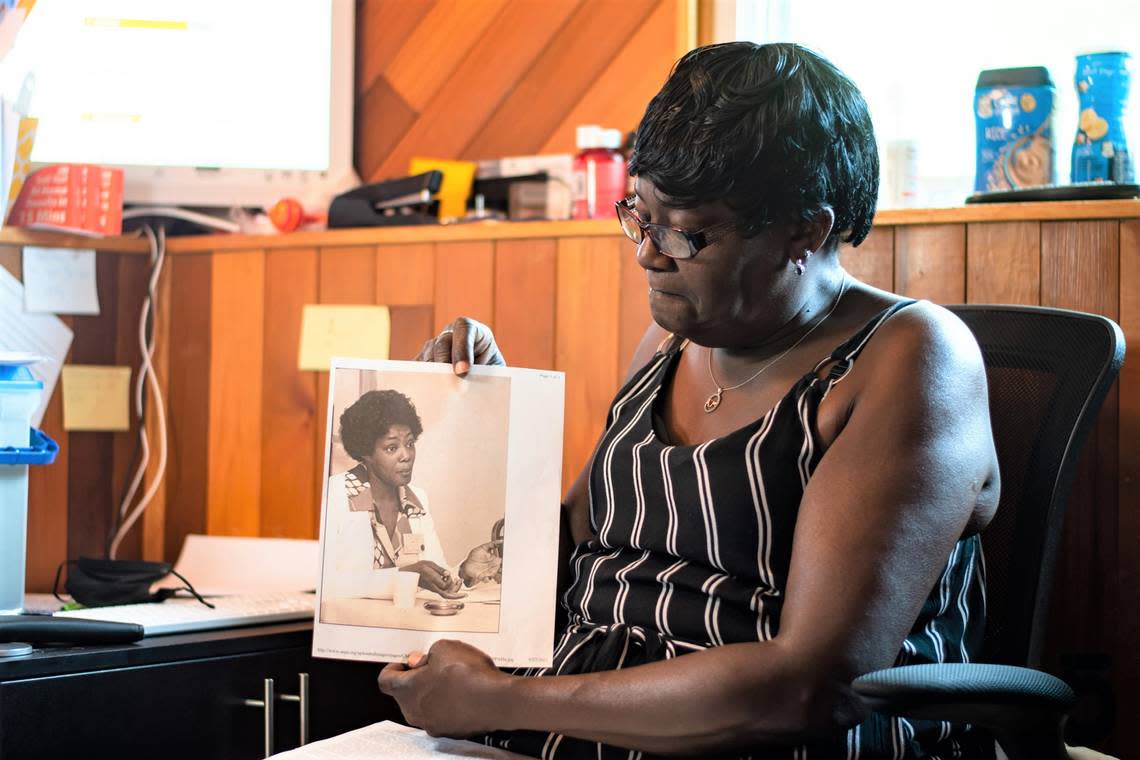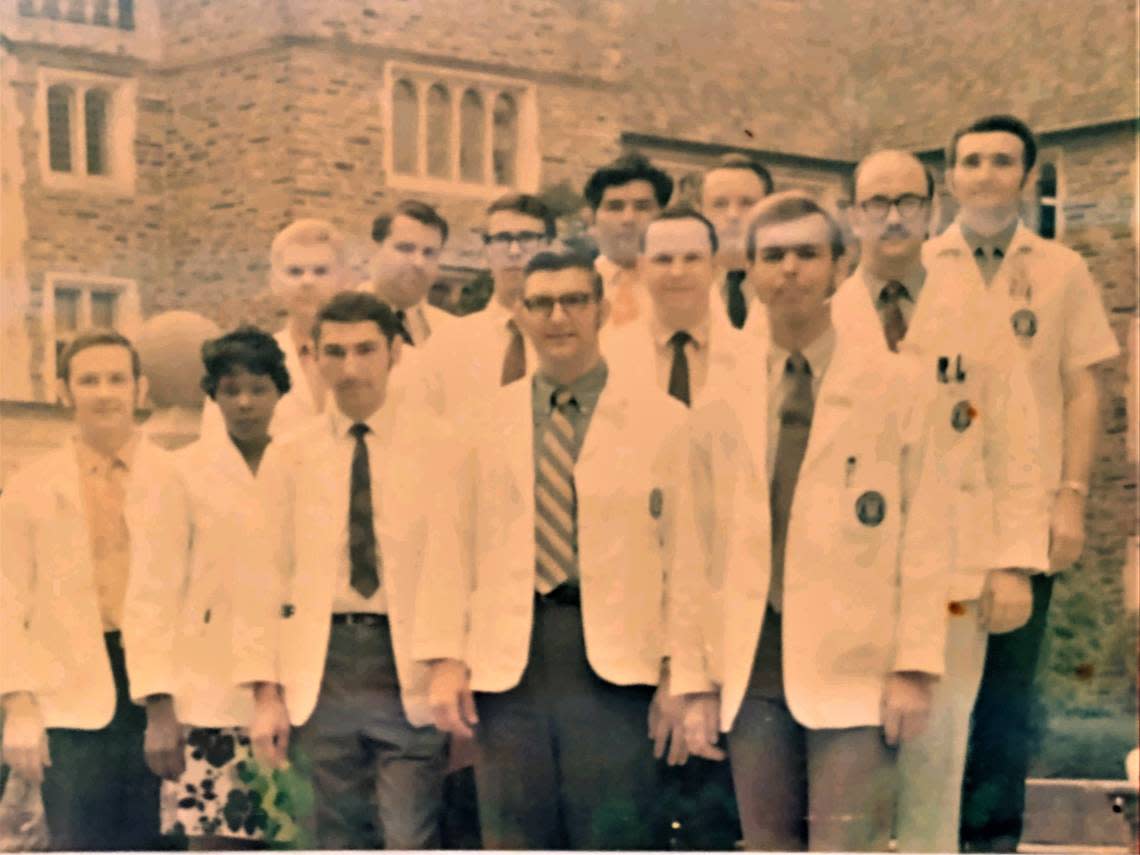Durham Housing Authority to name new building after former tenant it once evicted
If there’s one thing Symetta Williams, 62, loves doing — it’s talking about her late mother.
“I am the oldest daughter of Joyce Ann Clayton Thorpe Nichols,” Williams said during an interview with The News & Observer, raising her chin up high with pride.
As a single mother of three, Nichols became the first woman formally trained to work as a physician assistant in the United States when she graduated from Duke University’s program in 1970. She was also the first Black woman to work as a PA.
But before that victory, Nichols struggled financially. She had to drop out of the North Carolina College for Negroes (now N.C. Central University) and live in public housing.
Then the Durham Housing Authority, without an explanation, evicted her.
She sued the authority — her case eventually making it to the U.S. Supreme Court — and won. The decision paved the way for future protections for public housing tenants. She went on to become a commissioner for the housing authority and remained an ardent advocate in her community.
Nearly 54 years since the Thorpe v. Housing Authority decision, and almost a decade after her death, the DHA is naming a new public housing building “The Joyce” after Nichols (the last name she went by most of her life). The building is slated to open next spring.
“They named a building after my momma!” Williams said at the edge of her seat. “Something that’ll be here even when my kids are gone. ... My grandbabies!”

‘A woman to be reckoned with’
Joyce Clayton (her maiden name) was born June 28, 1940, on a farm in the unincorporated community of Timberlake, Person County, just over 20 miles north of Durham. Her father was a tobacco farmer and her mother, who died when she was a girl, a school teacher.
She was “a woman, from the country who grew up barely with shoes on her feet,” Williams said.
In 1964, Nichols’ first husband (Williams’ father) left her while she was pregnant with their third child, Nichols previously said in an interview for the Women in Duke Health exhibit.
She was left to fend for herself and her children, juggling a job as a nurse and pursuing her degree.
But having “never paid a light bill, or a water bill, or a mortgage,” Nichols said, she lost their home.
Williams remembers moving to McDougald Terrace, a public housing complex managed by the Durham Housing Authority.
She began recalling some her childhood memories there, simultaneously rolling up the right cuff of her black-and-white-striped jumpsuit to her thigh.
“I’ve got a scar on my leg right now from when we was living in McDougald Terrace,” she said. “I was 8 years old and a guy pushed me off the porch.”
There were metal hooks that Williams says secured the neighborhood trash cans. At first the doctors thought they would have to amputate, but Nichols, thanks to her medical training, helped save her daughter’s leg.
Despite their financial difficulties, Williams said she and her siblings didn’t know they were living in poverty and “had a good time.”
“It was nice,” she said. “Everybody knew everybody’s child.”
That was until the eviction.
Thorpe vs. Housing Authority of the City of Durham
Nichols was evicted three days after she challenged the housing authority for the substandard conditions in McDougald Terrace on behalf of women in the “Mothers Club.” The group, under Nichols’ leadership, was organized to hold DHA accountable for issues they were experiencing on the property.
“The manager said she didn’t have to tell me why I had to move. I had to move,” Nichols said in the Duke interview. “So I got rebellious, and I said, ‘I’m not moving. I’m not going anywhere.’”
While the N.C. Court of Appeals and the Supreme Court of North Carolina affirmed the eviction, Nichols appealed the decision and her case ended up in the U.S. Supreme Court. Around that time, the U.S. Department of Housing and Urban Development issued a notice stating that all evicted tenants should be told the reason for their eviction, according to a case summary by Oyez.
After more back and forth between the state and federal court, the high court ultimately ruled in favor of Nichols setting forth due process rights for low-income housing tenants.
“To see that the things she fought hard for (are) still being implemented and executed today,” Williams said, “it makes a big difference.”

She entered the Duke University Physician Assistant program in 1969. With the support of her second husband, McArthur Nichols, she graduated in 1970, becoming the first woman formally trained to be a physician assistant in the country.
Throughout her career, she received several awards and national recognition for her advocacy for rural, low-income and Black patients everywhere.
Joyce Nichols Rural Health Clinic from PA History Society ® on Vimeo.
In 1995, right around the time she retired as a physician assistant at the Lincoln Community Health Center, Nichols joined the DHA Board of Commissioners and became chair.
She died July 29, 2012 at her home in Durham. She was 72 years old.
“I love her,” Williams said, gently holding a portrait of her mother. “I miss her.”
‘The Joyce’
DHA board member Angela Holmes contacted Williams earlier this year to share the news that the housing authority was considering naming its new building after Nichols.
“I said, ‘What?!’” Williams said. “She called me back two weeks ago and said, ‘It’s official.’”
The Joyce, an $18.8 million, four-story, 80-unit senior housing development, is located a block away from the Duke University Physician Assistant department on South Duke Street near downtown Durham. It is next to the existing J.J. Henderson Housing Center for Seniors, also managed by DHA.
The development is part of the DHA Downtown & Neighborhood Planning project in partnership with the city of Durham and Durham County to increase and preserve affordable housing.
The housing authority has been criticized for not always honoring the history of the communities it builds in.
Anthony Snell, director of development for DHA, says naming the new building after Nichols does just that.
“We’re just picking up the pieces, and the history is part of this community,” he said. “That story. That foundation that has been laid by the history, it inspires us and gives us what we need to move forward with our vision.”
Ron Stewart, an executive at Laurel Street Residential, the developer of The Joyce, said a lot of research is going into the project to help tell Nichols’ story.
“Not only will the building be named in her honor, we’re also going to incorporate some of her history inside the building,” he said. “Plaques that tell a little bit about her story. Photographs of her. Maybe naming another component of the building, like the residents’ lounge or the fitness center, things like that, that help tell her full story.”
